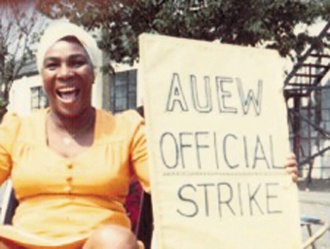This is the last article you can read this month
You can read more article this month
You can read more articles this month
Sorry your limit is up for this month
Reset on:
Please help support the Morning Star by subscribing here
IN THE long, hot summer of 1976 four hundred women won equal pay from the US multinational Trico-Folberth, Brentford, West London and that was despite a newly enacted equal pay law.
It was won as a result of direct strike action and based on solidarity, sheer determination and, ultimately, a negotiated settlement achieved by our trade union, the Amalgamated Union of Engineering Workers – the AUEW, now part of Unite.

Our strike took place in the context of new progressive legislation which had galvanised us, and thousands of other women, to recognise our rights. Namely this was the Equal Pay Act (EPA) 1970, introduced by Barbara Castle, which finally came onto the statute book at the end of 1975.
Trico had used gender segregation of jobs as a means of maintaining women assembly workers as cheap labour in the factory. Then the night shift was closed down and five male operators, who did not accept redundancy, came to work alongside the female production workers on day shift.
People talk and it wasn’t long before the women discovered they were being paid £6.50 less than the men doing identical work. That was the spark that ignited the strike.
Similarly today it is the new gender pay gap reporting requirements on companies with over 250 employees that have precipitated equal pay back onto the public agenda. There had been little previous specific campaigning on the issue for years.
Suddenly there has been renewed shock and fury at such blatant discrimination. And that is after 40 years of equal pay legislation!
No-one wants to go on strike and suffer the hardship we did at Trico in the 21 weeks it took to win. We were up against a company that used the originally weak equal pay legislation to try to defeat us.
It was a “lawyers’ paradise” riddled with loopholes for employers to exploit.
Currently going to a tribunal may be the most appropriate course of action or your only recourse. But when the company took out an application to the tribunal, confident of getting a ruling against us as they did, we boycotted the proceedings and battled on. You don’t have to be an Einstein to recognise when you’re being paid less than someone else! In fact it was the example of Trico that contributed to pressure for the EPA to be amended in 1983 to include equal pay for work of equal value.
Trico became a shining example of what can be achieved through collective working class and trade union action. Could we achieve such a victory today?
Since the time Thatcher came to power successive anti-trade union legislation has disempowered workers to such an extent that we would now be prevented from coming out on strike at all.
In the first place current balloting provisions mean that rather than us women voting on a show of hands, after listening to our shop stewards and local AUEW officials, a secret ballot would be required of the entire shop floor taking weeks. Given the hostility of the majority of the men in the factory towards our cause, this would have prevented us taking any action.
The Tories did not introduce balloting clauses to democratise the workplace. They knew that by making the whole process labyrinthine and individualised, workers would vote in their own homes prey to constant media and company pressure, disconnected from trade union discussion.
Interestingly, throughout our five month campaign, the strike committee organised almost weekly mass meetings of all those involved, with our leading shop stewards and local AUEW officials giving feedback on progress and problems facing us. We well remember the rousing and humorous speeches made by Eileen Ward, a senior Trico AUEW steward, who became an outstanding leader of the strike. At the conclusion of each meeting we voted on whether to continue our action to ensure we had a full mandate and give a clear message to the company and waiting media that we were not weakening.
Crucially the trade union, labour and women’s movement responded to our needs, contributing over £262,000 in present day value to our hardship fund. In response to our calls for assistance supporters turned up on the picket line to supplement our numbers and give us moral support. This was in the face of the mercenary-style convoys organised by the company to break through the picket lines with police assistance.
This vital solidarity is now deemed illegal as secondary action under the Trade Union Act 2016. We desperately need a Labour government in power to repeal this vicious legislation, as Jeremy Corbyn and John McDonnell have pledged to do.
The Establishment and mainstream media are adept at whipping up the difficulties and divisions within the labour and trade union movement to distract and ultimately destroy working class gains.
We can lose sight of the bigger picture consumed as we are by our defeats or retreats. For the same reason the Establishment is happy for us to forget our victories. How was it that the Trico strike was “forgotten” for so long? We need to learn from our “Tricos” — the power of women and working class solidarity backed up by strong trade union organisation to make gains that benefit us all – not to forget them.
Sally Groves was publicity officer on the AUEW Trico Strike Committee.
A book launch for TRICO – A Victory to Remember by Sally Groves and Vernon Merritt will be held at 7pm, Friday September 21 at Marx Memorial Library, 37A Clerkenwell Green, London, EC1R 0DU. Contact (020) 7253 1485.











